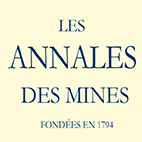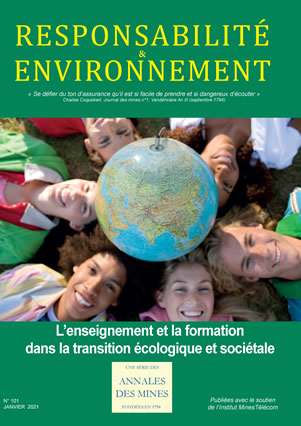 N° 101 - January 2021 - Education and training for the environmental and societal transition N° 101 - January 2021 - Education and training for the environmental and societal transition
Issue editors: Cécile Renouard and Rémi Beau
Préface : Barbara POMPILI,
Ministre de la Transition écologique
Introduction :
Barbara Pompili,
minister of the Environmental Transition
and
Cécile Renouard,
professor of philosophy, Centre Sèvres (Jesuit Faculty of Paris), École des Mines de Paris, ESSEC and Sciences Po;
and
Rémi Beau,
researcher in philosophy, CNRS, Institut d’Écologie et des Sciences de l’Environnement de Paris, Sorbonne University
Which transitions to teach?
For a history of the energy and material symbioses
Jean-Baptiste Fressoz,
historian, Centre de Recherches Historiques, CNRS-EHESS
Between crises and transitions: What education for public health?
Cyrille Harpet,
research professor, École des Hautes Études en Santé Publique de Rennes (EHESP), assistant director of the research unit Arenes (UMR 6051)
An education for which environmental transition?
Luc Abbadie,
professor of environmental studies, Sorbonne University
The difficult conversion of research in economics to a concern for the environment
Quentin Couix,
Centre d’Économie, Paris 1 Panthéon-Sorbonne University; and Gaël Giraud, CNRS, Environmental Justice Program, Georgetown University, Washington, DC
On the right use of mathematical models
Ivar Ekeland,
professor emeritus, Paris-Dauphine University and University of British Columbia
Interview with Dominique Bourg,
philosopher and honorary professor, Lausanne University
Research professors faced with disciplines undergoing the transition
Educational issues related to the transitions in farming and the food supply: Diversity and complexity
Patrick Caron,
ART-DEV, Montpellier University, CIRAD
A science of encounters: Ecology at the service of multidisciplinary educational approaches
Hélène Barbé,
Laboratoire Écologie, Systématique et Évolution (ESE), Paris-Saclay University;
Caroline Vincent,
ESE, Paris-Saclay University;
Cécile Blatrix,
professor of political science, AgroParisTech, Laboratoire Professions, Institutions, Temporalités (CNRS-UVSQ);
and
Nathalie Frascaria-Lacoste,
professor of evolutionary ecology and environmental engineer, AgroParisTech, ESE, Paris-Saclay University
Metamorphoses of the law to cope with the requirements of the environmental transition
Kathia Martin-Chenut,
research director in legal studies, CNRS, Institut de Sciences Juridiques et Philosophiques de la Sorbonne (UMR 8103 ISJPS – CNRS/Paris 1 University);
and
Camila Perruso,
postdoctoral student, Institut des Sciences Philosophiques et Juridiques de la Sorbonne
Interview with Marc Dufumier,
agroeconomist, specialist of farming systems and their evolution
Alternative educations: National and international examples
Educations for living in the Anthropocene epoch
Nathanaël Wallenhorst,
associate professor HDR, Catholic University of the West (UCO, Angers);
and
Renaud Hétier,
professor, UCO
A university education in the Anthropocene epoch: A Norwegian perspective
Frédérique Brossard Børhaug,
professor of the science of education, VID Specialized University (Stavanger, Norway)
Interview with Mark Swilling,
distinguished professor of sustainable development, School of Public Leadership, University of Stellenbosch, visiting professor at the universities of Sheffield and Utrecht, and Bass Scholar at Yale University
From knowledge to skills: Job training for the transition
From observations to actions: The issues of occupational training for the environmental transitions
Jacques-Olivier Garda,
engineer ICAM, MBA Sciences Po, Innov’Active
Educating architects for the environmental and social transition
Dimitri Toubanos,
architect, urban planner, associate professor, ENSA Paris Val-de-Seine, ENSA Paris-Belleville and Sciences Po Paris, researcher at EVCAU and associate researcher at LIAT;
and
Philippe Villien,
architect, urban planner, associate professor, ENSA Paris-Belleville, researcher IPRAUS, UMR AUSser
Four families of “competences” for the socioecological transformation
Gérald Majou de la Debutrie,
special advisor on sustainable development and societal responsibility, Conférence des Grandes Écoles (CGE)
Training for the environmental transition in firms
David Laurent
and
Méliné Reita,
Entreprises pour l’Environnement (EpE)
Interview with Alain Grandjean,
economist and consultant, president of the Nicolas Hulot Foundation and cofounder of Carbone 4
Miscellany
Policies for protecting biodiversity and ‟ecological redlining” in Chine: What implications for COP15?
Juliette Landry, Aleksandar Rankovic
and
Lucien Chabason,
Institut du Développement Durable et des Relations Internationales (IDDRI)
|




